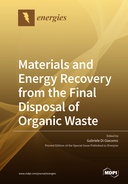Explore

Materials and Energy Recovery from the Final Disposal of Organic Waste
0 Ungluers have
Faved this Work
Login to Fave
The book is a collection of scientific contributions that highlight how scientific and technological evolution can change the paradigm of organic waste as an environmental problem into a renewable resource of energy and materials. Numerous researchers and research institutions that are located in different countries with varying levels of socio-economic development and other traditions were involved in this work. The materials that were considered include household waste, including human excreta and those generated by typical urban activities. The organic waste was derived from the agro-industrial sector and from packaging labelled as being biodegradable. Problems related to the detoxification of aquatic plants are discussed and the use of these plants for their ability to produce biomethane is documented simultaneously. An organic waste management strategy that was developed in the Albania context is also presented and discussed. Anaerobic digestion is one of the most widely studied technologies in this field, and this process is responsible for the production of biogas or methane, even in fossil resource-rich countries. On the other hand, aerobic fermentation is considered for the degradation of very toxic organic substances that can be dissolved into aqueous solutions that aid in the recovery of valuable materials from electrical and electronic equipment that do not have further use. There are a wide range of arguments and experiences that support the use of waste as a resource through disposal with simultaneous energy enhancement and the production of new materials, thus limiting the use of non-renewable resources for more sustainable development for the benefit of future generations.
This book is included in DOAB.
Why read this book? Have your say.
You must be logged in to comment.
